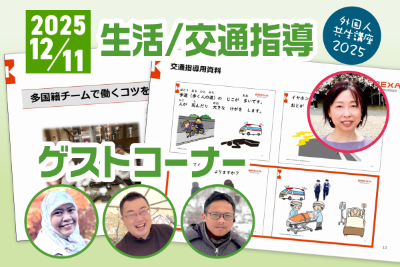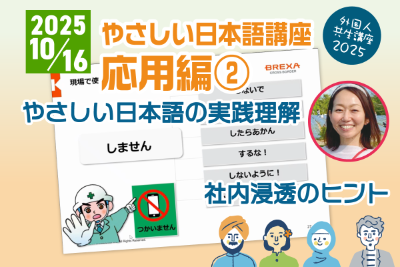- やさしい日本語
- ひらがなをつける
- Language
We provide multilingual content through machine translation. Translation accuracy is not 100%. About the multilingualization of the JAC website
- About JAC
- JAC Membership Information
- Specified Skilled Worker Acceptance
- Specified Skilled Worker Overview of the system
- 10 Mandatory Assistance for Foreigners
- Online individual consultation
- Seminar on Coexistence with Foreign Nationals
- Leading examples of host companies
- Case studies collection "Visionista"
- Foreigner's Voice
- Foreign Resident Acceptance Manual / Q&A
- Useful column "JAC Magazine"
- Acceptance support services
- Specified Skills Acceptance Support Service
- Skills improvement support
- Online Special Education
- Skill training
- Japanese Language Course
- Education and Training Support
- Subsidy system for obtaining qualifications
- Support for creating a comfortable workplace
- Temporary Return Support
- CCUS charge support
- Support system for promoting the accumulation of employment history
- Post-acceptance training
- Compensation system for Specified Skilled Worker (i)
- Daily life support
- Medical interpretation support
- Support for daily life problems
- freeJob matching
- The Specified Skills Evaluation Exam
- Home
- JAC Magazine
- Working with foreign workers
- Be aware of religious issues and considerations when accepting foreign workers
- Home
- JAC Magazine
- Working with foreign workers
- Be aware of religious issues and considerations when accepting foreign workers

Be aware of religious issues and considerations when accepting foreign workers
I wrote the article!

(One company) Japan Association for Construction Human Resources
Chief of Research and Development Department / Administration Department / Public Relations Department
Motoko Kano
(Kano Motoko)

Hello, this is Kano from JAC (Japan Association for Construction Human Resources).
In Japan, there is an atmosphere of tolerance towards religion, with people enjoying Christmas and Easter, visiting shrines for the first visit of the year, and having Buddhist funerals.
As a result, many people seem to be unaware that consideration must be given to some religions, and that differences in religious views can lead to problems.
When accepting foreigners, religion is an unavoidable issue.
This time, we will introduce what you should know about religion, what you need to be careful about, and common problems that may arise when accepting foreign workers.
Get the right information and be fully prepared.
Check the customs of each religion before accepting foreign workers!
It seems that when Japanese people are asked, "What do you believe in?" not many can answer immediately.
"I think it's Buddhist because my ancestors have believed in Buddhism for generations, but I don't know the sect."
"I had a Shinto wedding ceremony, but I don't think I have any religious faith."
"I went to a Buddhist kindergarten, but a Christian high school."
It is surprising for foreigners that so many different religions exist together in this country, yet they are so integrated into daily life that people live without questioning it.
As a result, Japanese people tend to underestimate religious issues.
However, with the recent increase in foreign workers, more and more companies are seeking to learn about religious differences in advance and taking measures to address them.
However, because there are many different religions, it is not enough to simply set prescribed rules or follow other companies' example, and many companies still struggle with religious issues.
The first step is to learn about religion.
Here we will introduce some of the most widely practiced religions in the world.
*These are only general characteristics of each religion. Beliefs and customs may differ depending on the sect, region, or individual.
Islam
Islam, one of the world's three major religions, is practiced throughout the world, particularly in the Middle East and Asia.
Indonesia has a particularly large number of Muslims in Asia, with 87% of the population practicing Islam.
They believe in one God, Allah, and the Quran, which is a compilation of Allah's teachings, is their holy book.
The word "Muslim" means a follower of Islam.
Muslims have strict religious rules, including praying five times a day facing the holy city of Mecca, abstaining from food and water during the daytime during the fasting month, and not consuming pork or alcohol.
Also, the head is considered sacred and should not be stroked, even by a child's head.
There also seems to be a belief that Muslim women should not show their skin or hair to men outside their family.
Christianity
Christianity has the largest number of believers in the world and includes many other denominations in addition to the well-known Catholic and Protestant churches.
Countries with many believers include the United States, European countries, China, South Korea, Vietnam, the Philippines, and Brazil.
In Christianity, there are very few dietary restrictions, but some denominations prohibit meat in general, alcohol, coffee, black tea, and tobacco.
Buddhism
Buddhism, one of the three major religions in the world, is a religion that is also familiar in Japan.
Countries with many believers include China, Vietnam, and South Korea.
In Buddhism, food-related restrictions often apply to certain sects, monks, or believers.
Prohibited ingredients include all meat, beef, garlic, chives, scallions, onions, and chives.
Confucianism
Confucianism is a teaching preached by Confucius, and it places great importance on "benevolence," which is caring for others, and "propriety," which is behaving in a way that is appropriate to your relationship with the other person.
This leads to the idea of placing importance on those superiors.
Although Confucianism is not counted in the number of followers, its ideas are deeply rooted in China, Korea, Taiwan, and other countries.
This influence is particularly noticeable in South Korea, where many people have a strong sense of absolute obligation to follow the teachings of their elders.
For example, even if a boss offers a subordinate a drink, the subordinate may refuse to drink before the boss, or may turn his or her face away and drink without being seen.
Judaism
Judaism is divided into three major sects, some of which have strict dietary regulations while others allow freedom in eating.
Countries with large Jewish populations include Israel, the United States, and Russia, but there are believers all over the world.
In Judaism, no work is permitted on the Sabbath.
Be careful, because in addition to regular work duties, activities such as writing, starting a fire (cooking), and sewing are also considered labor.
Foods that should be avoided in Judaism include pork, blood, squid, octopus, shrimp, crab, eel, shellfish, rabbit, horse, meat that has not been properly treated according to religious standards, and combinations of dairy products and meat dishes (such as cheeseburgers and meat gratin).
For Jewish people, Japanese food, which is centered on vegetables and fish, tends to be easy to eat, but since blood is disliked as something unclean, care must be taken with how it is prepared.
Hinduism
Hinduism is a religion that stands out from other religions in that most of its followers are in India and Nepal.
This is because Hinduism was formed through the fusion of ancient Indian Brahmanism and folk beliefs.
Although India's unique caste system, a class system known as caste, has been banned by the Constitution, it remains deeply rooted to this day, and there are other strict regulations in place, such as the occupations that people can have being determined by their class status.
Even some people do not want to eat meals with people of a different caste.
When it comes to food, you should be careful with all meat, all seafood, eggs, raw foods, garlic, chives, scallions, onions, and chives.
Strict Hindus avoid eating meat in general, so these foods are likely to be taboo, but there seem to be individual differences, with some people only eating eggs.
Cows are especially worshipped as sacred animals, so eating them is taboo.
There is a strong aversion to uncleanness, and table manners are strictly regulated.
There is a belief that when passing food, you should use your right hand instead of the unclean hand (left hand), and that you should not eat other people's leftovers because they are unclean.
Be careful, as some people may consider serving food as leftovers.
Religious issues and points to consider when accepting foreign workers

In order to deal with religious issues that are likely to arise when accepting foreign workers, it is necessary to gain knowledge about the religion and be considerate.
We will introduce some specific examples of problems that are likely to occur, and also look at the points you should take into consideration.
Food problems
When it comes to meals, problems are likely to arise due to differences in foods that are taboo, dining etiquette, and attitudes toward food.
Specifically, there are the following problems and issues:
- I'm reluctant to eat a cold lunch
- I can't eat it because I don't know what ingredients are used.
- I can't eat it if it contains seasonings that contain alcohol, such as mirin or cooking sake.
- It is difficult to tell if gelatin, soup extract, lard, or meat is included.
For example, Chinese people value hot meals, so they are said to be averse to cold bento boxes.
You will need to be considerate when ordering lunch boxes for a large group.
In religions that have food taboos, what you eat is important.
When it comes to meals served in company cafeterias or employee dormitories, you can't eat them if you don't know the ingredients.
Also, in religions that prohibit the drinking of alcohol, products that contain seasonings such as mirin or cooking sake are often also not allowed.
If you are serving it as a set meal, it is a good idea to clearly state the ingredients and seasonings used.
In such cases, since gelatin extracted from animal bones, soup extract, and lard, which is pork fat, cannot be distinguished at first glance, it is necessary to devise ways to clearly indicate, using pictures or words, that "no pork is used" or "no beef is used"
However, in some cases in Islam, even pictures of pigs are considered taboo, so it is important to check individually.
For Muslims, another option is to provide halal certified food.
Halal means "permissible" in Islam and is a guideline for Muslims in daily life.
Halal-certified food and daily necessities are marked with a "Halal certification mark," so it would be effective to incorporate these into your diet or partner with restaurants that are Halal-certified.
The environment for worship is not in order
Muslims pray five times a day facing the direction of the holy city of Mecca.
Common problems that may arise in worship include:
- There is no place to worship
- I can't wash my feet before worship
- I can't attend the weekly Friday worship service.
Companies need to take care to provide prayer rooms and other facilities.
It is also possible to use an empty conference room as a prayer room, but since prayer rooms in mosques and other facilities are usually separated by gender, care must be taken to keep them separate.
It is also customary to hold communal prayers every Friday, so it is a good idea to discuss this in advance so you can take these into consideration, such as using a conference room for communal prayers or, if there is a mosque nearby, allowing employees to go out during work hours.
During the fasting month, no food or drink is allowed during the day.
In Islam there is a month of fasting called Ramadan.
During Ramadan, eating and drinking water is prohibited during the day.
You can eat and drink from sunset to sunrise the next day.
Therefore, during Ramadan, it is important to pay attention to your health during the day, such as making sure you do not become dehydrated.
If shift changes are possible, one option would be to work night shifts during Ramadan, allowing employees to eat and drink.
Problems with illness or injury
Some religions have taboos about showing skin to anyone other than the male family members, and in some cases women may refuse to be examined or cared for by male doctors or nurses.
Additionally, some religions prohibit blood transfusions.
There may be cases where an accident while at work requires urgent transport and every second counts, so it is important to thoroughly check in advance how to respond in an emergency.
For foreigners, religion is both a source of identity and a guide for life.
Let us not reject their ideas or beliefs, nor impose our values on them.
It is important for the host company for all employees, not just the relevant department or employee, to have a common understanding and accept the issue.
For more information on issues related to foreign workers other than religion, please see our article "Explaining common issues that can arise when hiring foreign workers and how to deal with them! Preventive measures are also introduced."
Please take a look.
Summary: Considering religion is important when accepting foreign workers!
The number of foreign workers is increasing year by year, but the problem of religion is a problem.
An increasing number of companies that accept foreign workers are taking measures, but the reality is that many companies do not know what to do.
There are many different religions in the world, and there are many things that Japan people cannot imagine, such as beliefs, customs, and ways of thinking that are rooted in life.
Let's start by knowing the main religion, such as its characteristics and taboos.
When accepting foreign workers, there are many problems related to religion, but measures can also be taken.
Problems caused by differences in religion range from food and worship to response to emergencies, but the tolerance range varies depending on the denomination and individual way of thinking, so it is important to check individually.
It is also important for all employees to show understanding of religion and have an attitude of acceptance of religion.
JAC will answer a variety of questions about the acceptance of Specified Skilled Worker in the construction industry.
If you are a company that is considering accepting Specified Skilled Worker in the construction industry, please feel free to contact JAC!
The author of this article

(One company) Japan Association for Construction Human Resources
Chief of Research and Development Department / Administration Department / Public Relations Department
Motoko Kano
(Kano Motoko)
Born in Aichi Prefecture.
He is in charge of public relations, research and investigation, and is the person behind social media.
We update our social media accounts daily with the desire to make people fall in love with Japan, to spread the appeal of construction from Japan to the world, and to ensure that Japan's construction industry continues to be the industry of choice around the world.
He is also engaged in research into the feasibility of implementing skills evaluation exam in Asian countries, and is conducting interviews with local organizations in each country.
Related articles

What is the Japanese level of Specified Skilled Worker? Precautions and measures after acceptance

Things to know when working with Muslim employees in a Japanese company

What is the obligation to notify the employment status of foreigners? Foreign workers who must be notified and how to apply

What is the status of residence that allows you to work? Explaining the types, how to obtain it, and more!

















